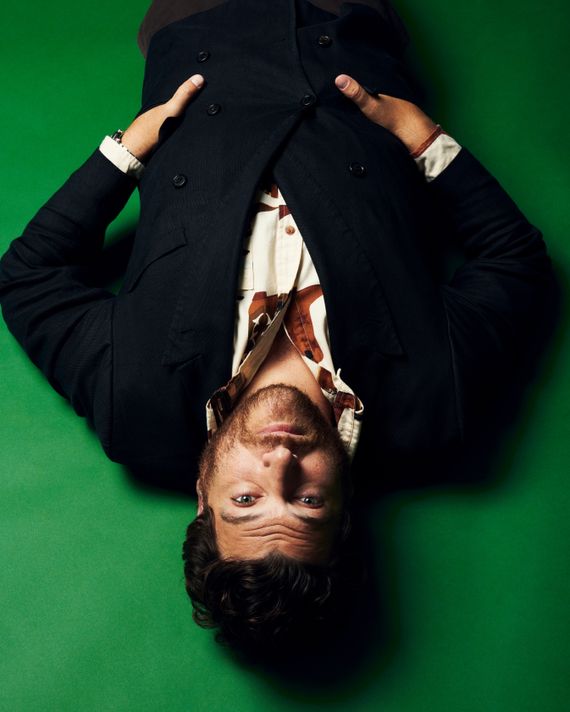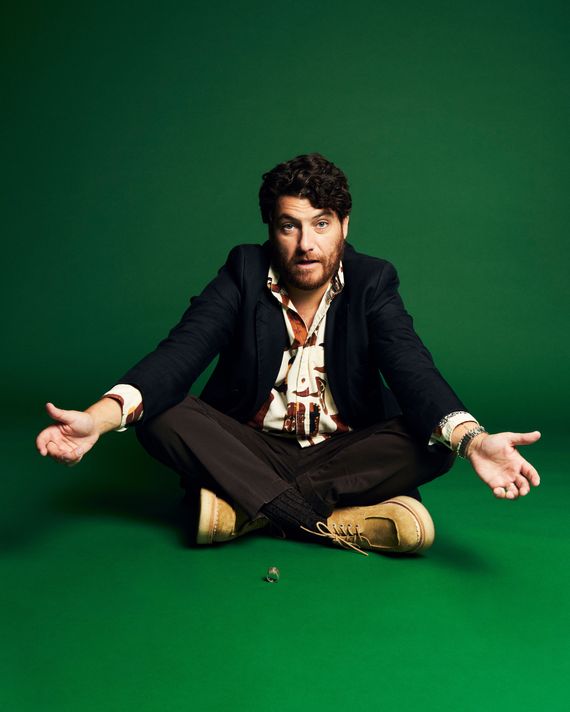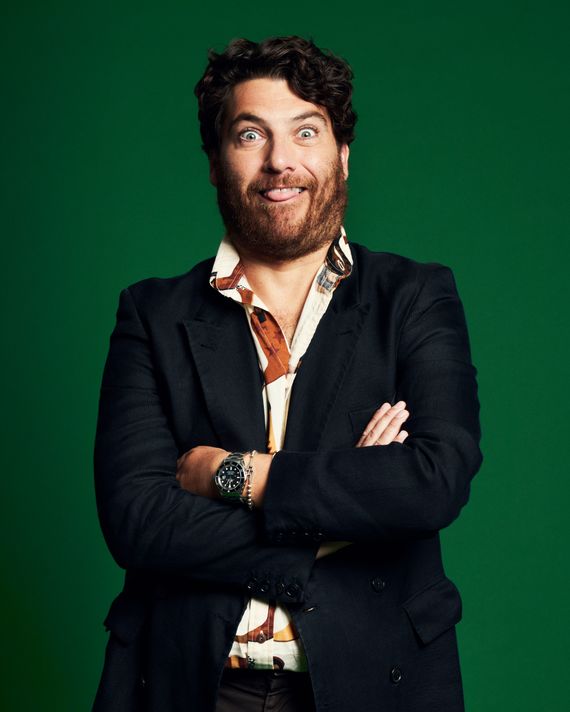
Adam Pally is waiting for a lunchtime martini at Grand Central Oyster Bar when a pair of young guys — maybe 19 or 20, looking like they robbed the Aimé Leon Dore store and are making their getaway back to Long Island — sneak a photo of him. At least, that’s what it looks like. Pally waves off the incident: “No way. I don’t ever get recognized.” If anything, they were probably confusing him for one of the other “handsome, schlubby Jewish guys,” he says, like Seth Rogen, Josh Gad, or Jake Johnson. That happens a lot. But Pally is comfortable being that guy people think they know from that one thing; he’s carved a career out of playing various smart-asses in movies (often ones that star Aubrey Plaza — The To Do List, Life After Beth, Dirty Grandpa) and shows (he’s most famous for playing Max Blum in Happy Endings) that people usually tend to discover after they’ve been axed. “I sort of cultivate it,” he says with a laugh.
His martini arrives, and Pally explains what he means. One night, he was out in London with his Sonic the Hedgehog co-star James Marsden, who casually mentioned that he invited a friend to join them. That friend was Justin Theroux. Within minutes, the outing went from chill to wild. A crowd surrounded the group, and everybody was taking pictures of them. “I’ve met Justin before, but he doesn’t remember who the fuck I am,” Pally recounts. “So I’m stuffing pizza in my mouth, and he’s looking at me wondering who the fat shit eating pizza is.” Just as he’s ripping a second slice, a young girl and her mother pass up Theroux and Marsden to ask Pally if he was on The Mindy Project. (He was.) It’s her favorite show. She asks for a picture with Pally, and as the girl and her mother walk away, Theroux “looks at me like Are you an actor?, and I felt like nothing matters anymore. It doesn’t matter who you are. There’s no notoriety. You could be on the hottest show on HBO or famous on TikTok, and it’s basically the same. Anybody that thinks they’re more famous besides maybe Tom Cruise is under a real delusion.”
Pally and I are meeting because a few weeks earlier, I recognized him on the street in Brooklyn. I introduced myself and told him that I had tickets to see his live show, An Intimate Evening With Adam Pally, and, given the ambiguous title of the event (which he advertised with a short clip to his Instagram promising “comedy and music” with “Interstate Love Song” by Stone Temple Pilots playing), asked him what I should expect. “I have no idea,” he said. “I’m still trying to figure it out.”
The general idea of An Intimate Evening is something of a one-man show, except Pally is joined by comedian, actor, and writer Dave Hill on guitar. Hill doesn’t do any talking; he just shreds. Pally is the main focus. He starts by getting up onstage to tell a little story that’s meant to bring the audience into the headspace he’s been occupying for the last several years. (I won’t spoil it, besides saying it made me want to cry, then laugh, then Pally started gently singing Sarah McLachlan’s “Angel” in a very twisted bit of perfect comedic timing.) From there, sometimes he brings a guest or two onstage, and they sing a song or tell jokes, giving it a feeling of a very well-curated variety show. Pally’s parents were lounge singers who performed at resorts in the Catskills and Manhattan nightclubs while he was growing up, so the whole thing can feel like a kind of communion with them, too.
Back at the Oyster Bar, Pally says that part of the reason he’s doing the show is to get over the stage fright he started developing sometime in 2017. He was in familiar territory at the Upright Citizens Brigade theater in Chelsea where he cut his teeth in the early 2000s, performing alongside one of his closest friends, Ben Schwartz. One show went well, he says, then “soon after that, I remember feeling not good onstage.” He points to the “fatigue of not killing, and not knowing what to do … I just couldn’t do improv anymore. I don’t know what happened, but it’s like I just forgot how to use a muscle or something.” It sounds like he’s making a joke, because he follows the confession with an unrelated observation about the clam chowder. (“I know the chowder is bad for you, but soup lies to your system. It makes you think you’re doing something healthy.”) But by his second martini, he’s back to the original thought. He says that what he’s doing now — “whatever it is” — feels intimate and different, and different is good. “I think anyone that looks inward for answers identifies with the question that I’m posing as the narrative of the show, which is basically, Why do anything? That’s the thought process I tend to have lately.”
Pally caves on the clam chowder, and after a server places it in front of him, he continues. “I don’t know whether it’s because I’m getting older or because people in my family tend to die young and I’m heading in that direction. But doing something that is even remotely uncomfortable these days, at this time, is very confusing,” he says. “Every business is dealing with it. Movies? Why go to the movies? Concerts? Why can’t I stream it? Everything feels, Why do anything?”
Pally admits he’s going through something, and the live show — on top of serving as stage-fright exposure therapy — is part of his way of working it out. He turned 40 last year, so I ask if maybe he is having a midlife crisis. He says no. “I think midlife-crisis stuff is somebody tries to sell you a convertible and you bought it because you think that’s what you’re supposed to do,” he says. “But it’s really just that you’re getting older, you’re staring death down, and it’s making you question everything.”
Pally already had a midlife crisis. “I thought my life was over,” he says, looking down at his half-empty bowl of chowder. His mother died in 2011 when he was 30; 20 days later, Pally’s first child was born. His career was starting to take off after he was cast on Happy Endings. The perfect storm of death, life, and work made it hard to get five minutes to himself, and so, after a few years (and another kid), he crashed. He felt like he’d broken down, that he’d gone as far as he could. Then a friend told him a story about working at a steakhouse in D.C., where twice a month, some lobbyist would die in the bathroom. Pally assumed they all overdosed or had heart attacks. No, the friend said — they all choked to death. “Men don’t like to tell you things,” Pally says. “So these big-shot lobbyist businessmen would start choking, and instead of asking for help, they walk into the bathroom to try to take care of it themselves, and then before you know it, there’s a dead man on the floor. I heard that, and I realized that was me.”
The difference between Pally and a lot of other guys is that Pally reached out for help — from friends, family, shrinks, and medication. He was getting his head in the right place, trying to focus on the moment, be happy, all that stuff. He and his wife, Daniella, had their third kid. In early 2020, he made his debut as Wade Whipple in the Sonic the Hedgehog film franchise, his most lucrative role to date. Then the NBC sitcom he co-starred in, Indebted, made its debut in February 2020, just when everybody was starting to talk about whether this COVID thing might be serious. The show lasted one season and was dead by June of the same year, but Pally thinks if circumstances were different — if, say, the show with him, Abby Elliott, Steven Weber, and current SAG-AFTRA president Fran Drescher as his mother was announced after The Nanny was rewatched by everyone in lockdown — that it would be a success. But who knows? He admits any long-term success can be wiped away in a second if some streaming-platform executive thinks there’s enough money to be saved by removing it.
That’s where the idea of An Intimate Evening With Adam Pally started — born out of a desire to have something that was his, something that couldn’t be deleted. He wanted to create something people had to go to, and that they had to participate in, but he wasn’t sure exactly what that was, so he started building the idea one show at a time. “I don’t think people get room to just try to figure something out,” he says. Whether the idea turns into a tour or a show or nothing, he still gets something out of it: “I feel happy at the end of the day.”
A few weeks after our martinis and clam chowder at Grand Central Oyster Bar, I meet up with Pally before his second live show at Pebble Bar. He’s sound-checking with Hill when that night’s special guest, John Gemberling, shows up. As people start filing in, Pally and I sneak to the little vestibule that simultaneously serves as coat-rack storage, the entrance to the bathroom, and the makeshift greenroom. He admits that he’s really nervous. It’s a small room, so everything has to hit right, or it could get awkward fast. I ask if he’s figured out what the live show he’s about to do is yet. He says he’s been thinking about it more since one of his best friends saw the show and told him that the thing he enjoyed the most about it was “it’s just exactly who you are.”
In the tight upstairs space at Pebble Bar that night, Pally and Hill do the same set I’d seen them do the last time, save for a few minor tweaks. They perform two Billy Joel songs and a Bruce Springsteen track off Nebraska, and Gemberling belts out Live’s “Lightning Crashes,” his karaoke go-to. While there’s a lot of clinking glasses and some light talking going on, everybody in the room is engaged. They’re smiling, they’re singing along, and the only time I see phones come out is to snap photos of Pally. It’s an experience that can’t be canceled or deleted. Pally might not ever be able to describe what An Intimate Evening is through a perfectly marketable summary, but before the show — after a fan walked up to us in that little vestibule, knowingly smiled at Pally, then squished past us toward the bathroom — he got close enough: “I think what I’m coming to is that it is mostly for me.”



